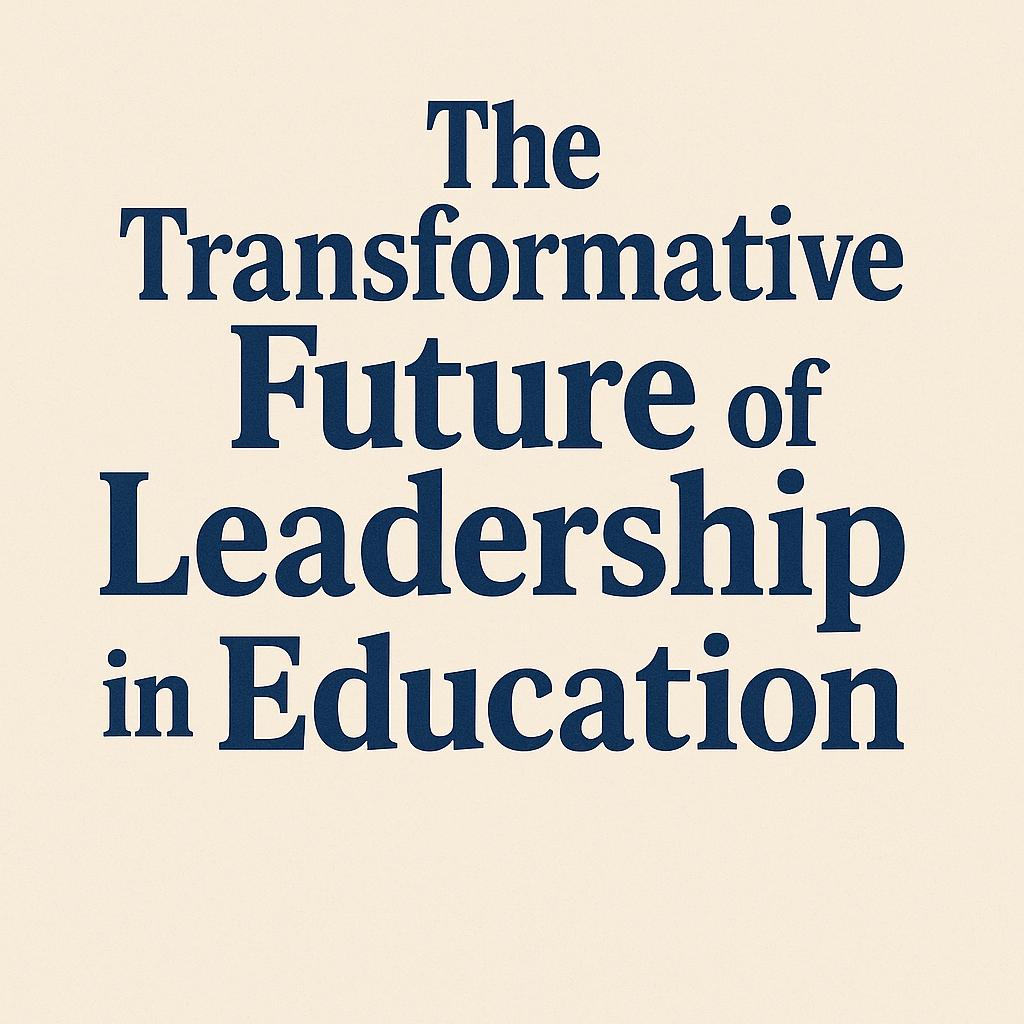The Transformative Future of Leadership in Education: Empowering Change and Inspiring Excellence 1000 Words
Introduction
Education is formidable of any progressive society, whose progress and development of institutions and students and the entire country is brought forward by its leadership. However, educational leadership must adapt to the new global challenges and opportunities created by globalization, technology and social change as the world rapidly evolves. Digital transformation, inclusive policies, innovative pedagogies and student-centered learning will shape the future of education. This piece discusses the critical trends, challenges, and strategies that will evolve educational leadership in the coming decades.

Educators’ Role in a Changing World, with One Eye to the Future
Educational leaders — from school principals to university administrators to policymakers — tend to have a large impact on what learning environments look like. In addition to administrative functions, their roles involve curriculum building, empowering teachers, and creating an environment ripe for innovation. This must include leaders responding to the changing demands of education with new strategies to remain sustainable and inclusive.
Essential Functions of Tomorrow’s Education Leaders:
Visionary Leadership: Any roadmap for educational institutions aligned to global trends.
Digital Integration: Using tech to support learning and admin efficiency
This work is directed towards diversity, equity and inclusion: making sure everyone can educate themselves, no matter their socio-economic background.
Teacher Development: Supporting continuous professional progression of teachers.
New Trends in Educational Leadership
Technology-Driven Leadership
Digitalization is transforming education and will require leaders to seamlessly embed technology into curricula, administration and student engagement. The need for technologies like Artificial Intelligence (AI), Virtual Reality (VR), Learning Management Systems (LMS) is on top of the list for educators. Leadership will need to be adept at using these technologies to support the learning experience while filling in education gaps.
Adaptive and Agile Leadership
We quickly learned in the post-pandemic world that we needed to be flexible with our education. Future leaders will need nimble decision-making skills, for they will need to react quickly to disruptions while ensuring the continuity of education. That encompasses building hybrid learning models that incorporate both in-person and online education fluidly.
Focus on Emotional Intelligence (EI)
Emotional Intelligence Is Becoming a Key Competency for Educational Leaders Emotional awareness and untangling leads to better communication, refined conflict resolution, and improved teamwork. High EI enables a leader to establish a nurturing culture that allows teachers and students to learn best.
We second with Inclusion and Diversity on the Leadership.
Educational Leadership in the Future will be centered around inclusivity and diversity. Which promote equity and allow for boub-in and decision-making by bringing in multiple perspectives.
Human Sustainability and Ethical Leadership
So, in a world grappling with environmental and ethical issues, they should make sustainable development a core principle of their policies. This encompasses the advocacy for green campuses, sustainable pedagogy, and responsible leadership that responds to sustainability objectives worldwide.
Issues / Challenges Facing the Educators of Tomorrow
Bridging the Digital Divide
Technology bolsters education but access is a struggle in parts of the globe. Addressing digital divide Leaders must act to correct disparities in digital access by not only providing the technology, but by ensuring it is affordable and readily available to students and educators.
Resistance to Change
Resistance from teachers, parents and institutions to new educational models. A good way to manage change is for a leader/leadership team to make sure they clearly communicate, provide training programs, and demonstrate how innovative changes can directly impact performance.
Mental Health and Well-being
The mental health crisis facing students and educators must be addressed. Policies should include stress management programs, counseling services and reforms to the academic curriculum to reduce pressure and reaffirm well-being as a priority.
Globalization and Cultural Sensitivity
This will require leaders to enhance cultural sensitivity and inclusivity, even more so as education is continuing to be globalized. In fact, cross-cultural competence will be vital for managing diverse classrooms and the inclusion of global perspectives in the curriculum.
Funding and allocation of resources
Money problems are generally the reason for an educational barrier. Innovative funding mechanisms, such as public-private partnerships and grants, are the way to go in maintaining and improving our future educational institutions.
Strategies for Effective Educational Leadership
Encouraging Lifelong Learning
Culture of continuous learning — Leaders need to encourage a culture of continuous learning in educators and students. DIgeramansentenced Besides the fact that education can be enhanced through professional development programs, research initiatives, and peer learning opportunities
Data-Driven Decision Making
This information would assist leaders in making better decisions about student performance, curriculum effectiveness, and resource allocation. This method improves efficiency and accountability.
Nurturing Cross-Departmental Collaboration and Community Engagement
To truly impact systems, we must engage communities, parents, and stakeholders. It is through the one and only collaborative leadership that we can guarantee the alignment of institutions with society.
Building a Governance That Is Ethical and Transparent
Keep integrity and trust within educational institutions with ethical leadership practices. Governance: Clear decision-making, accountability, and ethical policies set the stage for long-term success.
Curriculum and Teaching Methods Innovation
Educational leaders of the future shall need to promote reforms in curricula to emphasize critical thinking skills, creativity, and problem solving over rote learning. These strategies are lined up with the contemporary education reform movement, which aims to enhance student preparation for future skill requirements.
Conclusion
At the same time, you are being shaped by the technological and cultural context in which we live; and that context is one of constant change, disruption, technology competency, and an unconditional commitment to inclusivity and sustainability. With a commitment to innovation and ethical governance, educators can shape transformative learning experiences that equip students for a rapidly changing world. With the changing face of education, the responsibility of educational leaders will play an increasingly crucial role in societal, economic, and future learning transformations.
Also Read:- The Evolution and Significance of the Indian Constitution 1200 Words
